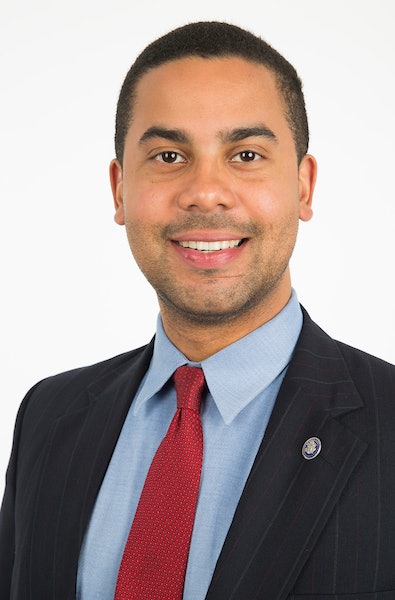As the world continues to grapple with the impacts of the COVID-19 pandemic, companies across sectors have shifted their strategies to meet industry needs. Distilleries are now producing hand sanitizer while car manufacturers met demand by making ventilators.
 Dietrich M. von Biedenfeld
Dietrich M. von BiedenfeldIn the higher education sector, the shift to online learning forced colleges and universities to rely on companies like Zoom to conduct classes and TimelyMD to offer mental health services virtually.
“Both private and public sector entities have adapted technology acquisition and implementation strategies to meet expectations during the pandemic,” said Dietrich M. von Biedenfeld, an assistant professor of business at the University of Houston-Downtown. “We have seen accelerated and expanded procurement schedules for digital tools for employees and students to work remotely.”
Now, as many campuses are well into the spring semester, companies such as Tide Cleaners are offering institutions a contactless approach to meet the needs of quarantined students.
Expanding on its existing subscription-based service, Tide developed the Quarantine Wash and Fold program.
“For our campus, this program has been absolutely worth it,” Dr. Melissa DePretto Behan, senior executive director for student life at Drexel University. “Knowing that a student who’s sick and not feeling well can put their laundry outside their door and take advantage of this service is so helpful. “For students and staff who may be more susceptible to the coronavirus, they’re also appreciative that the program is another step we’re taking to limit the spread of the virus on campus.”
As part of the program, students in quarantine are provided with a laundry bag to fill with clothes, sheets and towels. Once full, the bags are left outside of students’ rooms for 24 hours in order to reduce transmission risks. From there, the clothes are picked up and sent off to be professionally cleaned and folded.
Brittany McDermott, coordinator of student support and an health educator at Emory University’s Oxford College, said the program takes a “load off” the quarantine support team as it works to manage all of the students’ meals, academic supplies and other needs.
“You forget since you are freely moving all of the little things that you do every day to make your life easier,” she said. “You can go into your kitchen, you can make food, you can run to the post office or grab a charger you forgot. All those different things that come up in day-to-day life. But for these students, their movement is restricted.”
Drexel University, Georgetown University and Emory University are among the 12 institutions using the service. However, Allison DeLoach, associate director of campus development at Tide Cleaners, expects the program to expand as the semester progresses.
“It is just really meeting that need to be able to open safely and to provide a safe environment for their students,” she added. “We have seen really positive responses from these campuses who just had no other alternative. With students having to stay in their room and not being able to access the laundry facilities, I think this has been a huge help to those campuses who didn’t have alternative options.”
Going forward, as companies navigate COVID-19, von Biedenfeld emphasized that it is not a “one-size-fits-all strategy.”
“[Students] living with elderly parents or immunocompromised housemates will have concerns distinct from those worries of someone who is healthy and lives alone. Acknowledging these differences is essential to successful address of employee needs assessment and address toward success in work.”
Sarah Wood can be reached at [email protected].















